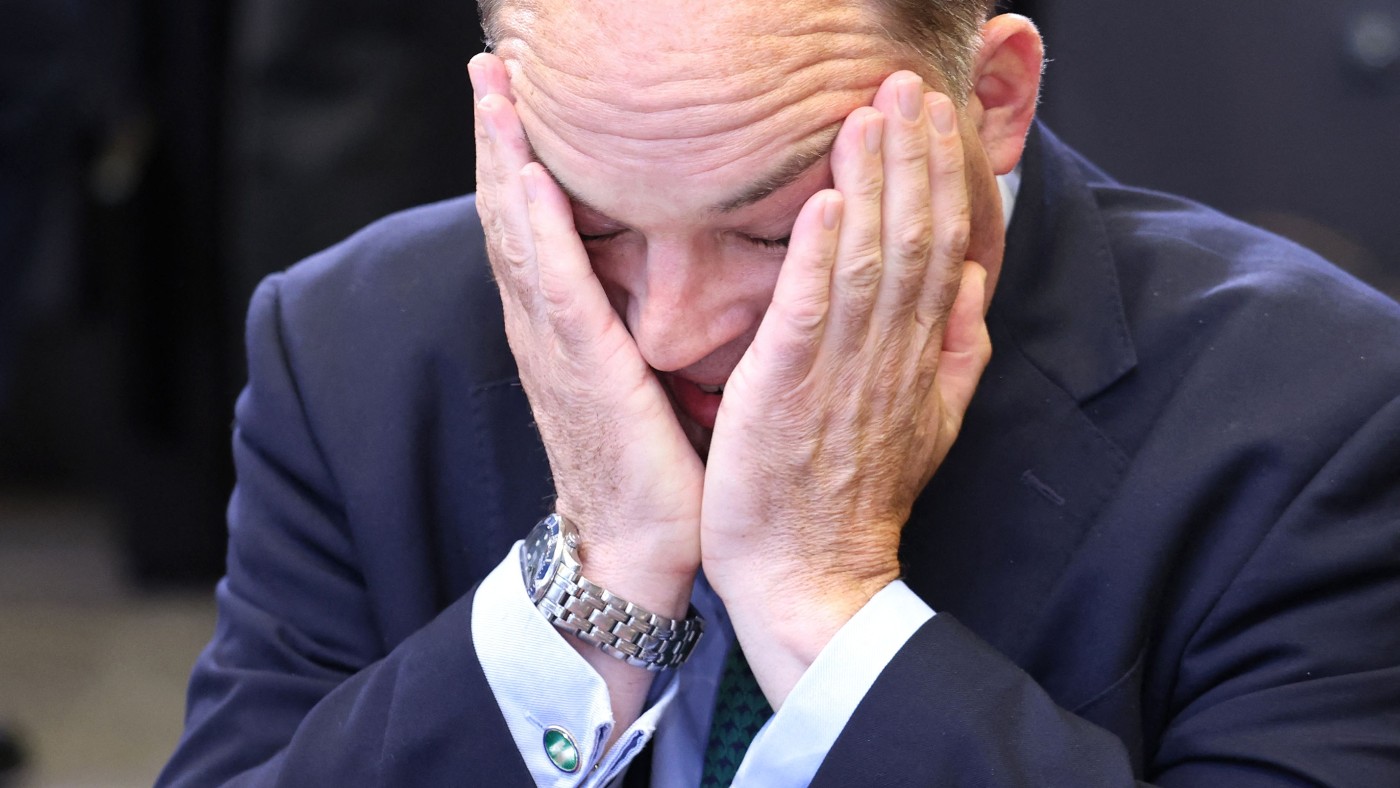Was Ben Wallace snubbed for top Nato job?
EU chiefs and Joe Biden blamed as UK defence secretary gives up on becoming alliance’s next secretary-general

A free daily email with the biggest news stories of the day – and the best features from TheWeek.com
You are now subscribed
Your newsletter sign-up was successful
Joe Biden has snubbed Britain and threatened the special relationship between the US and UK by blocking Ben Wallace’s bid to become Nato secretary-general, government sources claim.
The UK defence secretary had been among the favourites to succeed Jens Stoltenberg, whose tenure as chief of the Western military alliance is due to end in September after nine years at the helm.
But a “visibly deflated” Wallace told The Economist this week that “it’s not going to happen” – and some are blaming the US president. Allies of Wallace reportedly told The Telegraph that they believed Biden had torpedoed his bid, and potentially damaged relations between the two allies, by refusing to endorse him.
The Week
Escape your echo chamber. Get the facts behind the news, plus analysis from multiple perspectives.

Sign up for The Week's Free Newsletters
From our morning news briefing to a weekly Good News Newsletter, get the best of The Week delivered directly to your inbox.
From our morning news briefing to a weekly Good News Newsletter, get the best of The Week delivered directly to your inbox.
What the papers say
“Former soldier Ben Wallace would have made an ideal candidate” for Nato chief, wrote Mark Almond, director of the Crisis Research Institute in Oxford, for the Daily Mail. So Biden’s “snub” to Wallace is “clearly symptomatic of a wider vendetta against the UK”, Almond argued.
The US president’s “ageing and increasingly unpredictable mind is gripped by a sentimental Irish nationalism nurtured as a child during World War Two, when Eire was neutral to Hitler’s threat”.
Biden’s wife Jill may also have “lobbied her husband to block Wallace’s Nato bid because she wanted to put a woman in charge”, suggested Almond. Alternatively, the alleged obstruction may be “simply another of Biden’s many gaffes”.
The Nato role is decided “behind the scenes”, said The Guardian. “Some EU leaders, including the French president, Emmanuel Macron, were reportedly reluctant to accept a non-EU candidate.”
A free daily email with the biggest news stories of the day – and the best features from TheWeek.com
Britain’s withdrawal from the EU has been cited by some as the reason for Wallace’s lack of support for the post. Some leaders have “little appetite to hand the plum job to a Brit after Brexit”, said Politico.
Brexit is “not to blame” for Wallace “throwing in the towel”, insisted Europe editor James Crisp in The Telegraph. There are ���other more influential factors at stake”.
One is that “there is always a preference for a prime minister”, he added, and most of the other possible candidates, such as Mark Rutte, PM of the Netherlands, fulfil that requirement.
There have also been calls for a female leader, or someone from Eastern Europe. The choice of a prime minister or president from a country such as Poland would “send a strong message of defiance to Vladimir Putin”, wrote Crisp.
Biden has “torpedoed” Wallace’s chances, said the Daily Mirror, because he wants former Norwegian prime minister Stoltenberg to stay in the post.
However, added the paper, Biden has previously described Wallace as “very qualified” for the role.
Earlier this month, Biden was asked whether “in the light of the warm words right now about UK/US defence collaboration, particularly in Ukraine”, he thought “it is time for the first UK Nato Secretary General in two decades”. The US president replied: “Maybe, that remains to be seen,” said Sky News.
Nevertheless, said The Guardian, Washington is “thought to have had doubts about Wallace”, with some in the military “resenting the way he has forced the pace over Ukraine”.
What next?
Biden is thought to have persuaded top European allies, including France and Germany, to agree to postpone a decision on Stoltenberg’s replacement for a year.
There are murmurings in Westminster that this could have diplomatic consequences. Government sources told The Telegraph there are fears the snub may damage the special relationship between London and Washington.
Delaying the Nato leadership question until 2024 would also “push the decision into an EU election year”, pointed out Politico, allowing it to “become part of the political jostling over who will run the EU’s main institutions for the next five years”.
This would permit countries to “back a candidate at NATO, for instance, in exchange for getting their preferred candidate installed atop the European Commission”, it added, but “it’s not a solution everyone loves”.
Whoever eventually takes over from Stoltenberg at Nato will have a tough task, Wallace told The Economist, because that person “is going to have to please both Macron and Biden”.
They will also have to deal with “a lot of unresolved issues in Nato”, said the newspaper, including unrest over the target of member countries spending 2% of GDP on defence and the question of the alliance’s role beyond Europe.
Who will the successor ultimately be? Kaja Kallas, Estonia’s PM and a “fierce Putin critic”, has been mooted although some allies feel she may be “too confrontational towards Russia”, wrote Crisp. Kolinda Grabar-Kitarović, the former president of Croatia, is another possibility, but “Mette Frederickson, Denmark’s Prime Minister, ruled herself out of the running after meeting with Joe Biden earlier this month”, Crisp added.
Chas Newkey-Burden has been part of The Week Digital team for more than a decade and a journalist for 25 years, starting out on the irreverent football weekly 90 Minutes, before moving to lifestyle magazines Loaded and Attitude. He was a columnist for The Big Issue and landed a world exclusive with David Beckham that became the weekly magazine’s bestselling issue. He now writes regularly for The Guardian, The Telegraph, The Independent, Metro, FourFourTwo and the i new site. He is also the author of a number of non-fiction books.
-
 What to know before filing your own taxes for the first time
What to know before filing your own taxes for the first timethe explainer Tackle this financial milestone with confidence
-
 The biggest box office flops of the 21st century
The biggest box office flops of the 21st centuryin depth Unnecessary remakes and turgid, expensive CGI-fests highlight this list of these most notorious box-office losers
-
 The 10 most infamous abductions in modern history
The 10 most infamous abductions in modern historyin depth The taking of Savannah Guthrie’s mother, Nancy, is the latest in a long string of high-profile kidnappings
-
 How are Democrats turning DOJ lemons into partisan lemonade?
How are Democrats turning DOJ lemons into partisan lemonade?TODAY’S BIG QUESTION As the Trump administration continues to try — and fail — at indicting its political enemies, Democratic lawmakers have begun seizing the moment for themselves
-
 How did ‘wine moms’ become the face of anti-ICE protests?
How did ‘wine moms’ become the face of anti-ICE protests?Today’s Big Question Women lead the resistance to Trump’s deportations
-
 How are Democrats trying to reform ICE?
How are Democrats trying to reform ICE?Today’s Big Question Democratic leadership has put forth several demands for the agency
-
 The ‘mad king’: has Trump finally lost it?
The ‘mad king’: has Trump finally lost it?Talking Point Rambling speeches, wind turbine obsession, and an ‘unhinged’ letter to Norway’s prime minister have caused concern whether the rest of his term is ‘sustainable’
-
 Why is Tulsi Gabbard trying to relitigate the 2020 election now?
Why is Tulsi Gabbard trying to relitigate the 2020 election now?Today's Big Question Trump has never conceded his loss that year
-
 Is the American era officially over?
Is the American era officially over?Talking Points Trump’s trade wars and Greenland push are alienating old allies
-
 Trump’s ‘Board of Peace’ comes into confounding focus
Trump’s ‘Board of Peace’ comes into confounding focusIn the Spotlight What began as a plan to redevelop the Gaza Strip is quickly emerging as a new lever of global power for a president intent on upending the standing world order
-
 Trump’s Greenland ambitions push NATO to the edge
Trump’s Greenland ambitions push NATO to the edgeTalking Points The military alliance is facing its worst-ever crisis